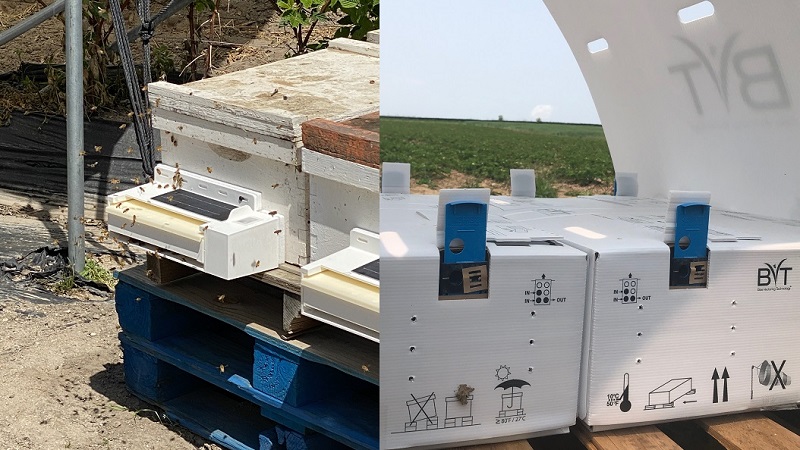Taking the Lead on Florida Tomatoes is an Honor

Longtime Florida Tomato Exchange leader Reggie Brown [left] is handing off the baton to Michael Schadler in 2018.
The Florida Tomato Committee continues to fill three primary roles: 1) to regulate first handlers of tomatoes in Central and South Florida in terms of grade, size, and container weight; 2) to coordinate and fund research that benefits the industry; and 3) to promote Florida tomatoes through marketing activities.
Research funding is currently the biggest line item in our budget, reflecting the importance of this investment to the industry. The majority of funding is allocated to UF/IFAS to support ongoing R&D efforts in disease and insect management, soil fumigant systems, as well as genetic improvement and hybrid development of tomatoes. Developing a tomato that can be mechanically harvested is at the very forefront of the breeding program.
The Florida Tomato Exchange —through its members — accounts for about 80% of the tomatoes produced in Florida. The Exchange complements the Committee’s work by handling government affairs that affect the industry. This includes trade policy, food safety, immigration reform, as well as other policy issues.
Full Plate of Politics
With a new administration in Washington, 2017 was an active year for the Exchange, and 2018 is shaping up to be just as active. As of this posting, we are in the midst of advocating for a renegotiated Suspension Agreement between the U.S. Department of Commerce and the Mexican tomato industry. The agreement suspends the dumping case that was brought against Mexico in 1996 in return for a minimum price Mexican imports cannot go below. While the agreement looks good on paper, and there was optimism in 2013 when it was last renegotiated, it has proven to contain too many loopholes that allow Mexican imports to circumvent the minimum price.
The Exchange contends that any new agreement must find a way to close these loopholes; otherwise the agreement should be terminated and a new dumping case should be brought against Mexico for the unfair trade practices that continue to harm tomato producers in Florida.
In less than 20 years, Florida’s share of tomato sales in the U.S. vis-à-vis Mexican imports have dropped from 60% to 30%, while Mexican tomatoes have increased from 40% to 70%. While there are various explanations for this trend, unfair trade practices such as dumping and government subsidies are significant contributing factors.
Belaboring an Issue
Another noteworthy policy issue that the Exchange will work on in 2018 is immigration reform. As is widely recognized, workforce availability is coming to a head for all specialty crop producers. Although Congress continues to kick the can on immigration reform, there is hope that progress might be possible in 2018 to reform the H-2A guestworker program.
Florida is now the state that uses the most H-2A labor in the country, and for better or worse, tomato growers in the state are increasingly considering H-2A as an option. But H-2A is not a tenable long-term option for Florida tomato growers or agriculture as a whole. As such, the Exchange will continue to actively partner in the effort to educate Congress and other policy makers on the crucial need for reform.
Meanwhile, in partnership with the Exchange, the Committee will continue to fund breeding and technology efforts to help the industry get to a point where not as much labor is needed to harvest the crop in the first place.
There is no shortage of challenges facing Florida’s tomato growers, but the Committee and the Exchange stand ready to help the industry survive, innovate, and grow in the decades to come.










